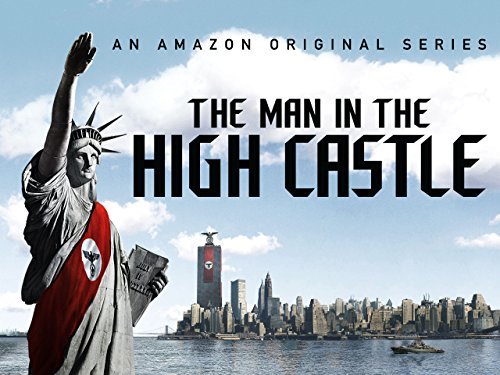Tags

The first season of The Man in the High Castle (2015) isn’t perfect but it’s my favourite television show of the year so far, a moving, engrossing drama which sheds light on our reality by depicting an alternative one. Set in 1962, years after the Axis powers won World War Two, the Japanese control the western Pacific States of America while the Nazis control the east coast. The two empires have their own cold war, and the background of season one is a crisis point as a group within the Nazi regime attempt to provoke Japan into a war Japan cannot win. In an incredible twist of sympathies and political intrigue, by the end the creators have the audience hoping that the aging Hitler will not be assassinated.
The unsettling brilliance of this show is in its depiction of everyday American life continuing under occupation, altered yet still familiar. It seems so convincing how easily most citizens have accepted Nazism. A kindly police officer helps one of the main characters with a flat tire and when they’re showered with ash, he explains that today is the day the decrepit are euthansed. In another scene where a character is invited to join in with a family still secretly practising Judaism, I was moved to tears by the courage and beauty of it.
There are many interwoven plotlines; at the centre is Juliana, who is drawn into the west-coast resistance when her sister is killed before her eyes. She sets out to complete her sister’s mission in the netural zone, delivering a film which, to her amazement, shows an alternative reality (our reality) where the Allies won the war.
The series is inspired by Philip K. Dick’s 1962 novel of the same name. In my late teens, Dick was my favourite writer. No adaptations of his works – this one included – have ever captured his brilliant, shoddy wackiness; perhaps A Scanner Darkly comes closest. Dick’s High Castle is his most polished novel and perhaps his least weird; this adaptation is less weird again, which is okay, as it realises the premise far more fully than Dick did, the political intrigue and drama of living in that world.
The reason I find the series less than perfect is its various narrative implausibilities, as characters go back to save someone or decide to do something that just doesn’t ring true. I could overlook this quite easily because I was taken away by the drama, the acting, the set design, and the exuberant daring of the entire show. It’s available on Amazon Video, which has a much smaller range of offerings than Netflix but also costs less than half the price.

Thanks for the review, Nathan, and for the tip about Amazon.
LikeLike
Thanks for reading Ted. Amazon commissioned a few interesting series – including an F. Scott Fitzgerald adaptation as well.
LikeLike
I don’t watch tv at all any more, but there seems to have beena renaissance since HBO started commissioning series about a decade ago. Glad Dick is getting attention. Intergalactic Pot Healer is my favourite of his novels. Own the movie Through a Scanner Darkly – I don’t do drugs but it’s great to watch late at night with a few grogs on board.
LikeLike
Thanks for the recommendation. Of course, I haven’t accomplished much else over the last seven days, but thanks.
LikeLike
Time well spent!
LikeLike